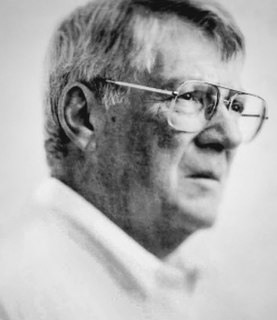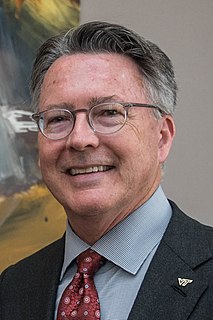Related Research Articles
Jennifer Alice Clack, was an English palaeontologist and evolutionary biologist. She specialised in the early evolution of tetrapods, specifically studying the "fish to tetrapod" transition: the origin, evolutionary development and radiation of early tetrapods and their relatives among the lobe-finned fishes. She is best known for her book Gaining Ground: the Origin and Early Evolution of Tetrapods, published in 2002 and written with the layperson in mind.

Herbert Charles Brown was an American chemist and recipient of the 1979 Nobel Prize in Chemistry for his work with organoboranes.

Herbert Wayne "Herb" Boyer is a researcher and entrepreneur in biotechnology. Along with Stanley N. Cohen and Paul Berg he discovered a method to coax bacteria into producing foreign proteins, thereby jump starting the field of genetic engineering. By 1969, he performed studies on a couple of restriction enzymes of the E.coli bacterium with especially useful properties. He is recipient of the 1990 National Medal of Science, co-recipient of the 1996 Lemelson–MIT Prize, and a co-founder of Genentech. He was professor at the University of California, San Francisco (UCSF) and later served as Vice President of Genentech from 1976 until his retirement in 1991.
The National Academy of Medicine (NAM), formerly called the Institute of Medicine (IoM), is an American nonprofit, non-governmental organization. The National Academy of Medicine is a part of the National Academies of Sciences, Engineering, and Medicine, along with the National Academy of Sciences (NAS), National Academy of Engineering (NAE), and the National Research Council (NRC).

The Yale School of Medicine is the graduate medical school at Yale University in New Haven, Connecticut. It was founded in 1810 as the Medical Institution of Yale College and formally opened in 1813.
Timothy Jerome "Tim" Kehoe is an American economist and professor at the University of Minnesota. His area of specialty is macroeconomics and international economics.
Richard Eugene Nisbett is an American social psychologist and writer. He is the Theodore M. Newcomb Distinguished Professor of social psychology and co-director of the Culture and Cognition program at the University of Michigan at Ann Arbor. Nisbett's research interests are in social cognition, culture, social class, and aging. He received his Ph.D. from Columbia University, where his advisor was Stanley Schachter, whose other students at that time included Lee Ross and Judith Rodin.

Herbert John Webber was an American plant physiologist, professor emeritus of sub-tropical horticulture, first director of the University of California Citrus Experiment Station, and the third curator of the University of California Citrus Variety Collection. Webber was the author of several publications on horticulture, member of numerous professional horticultural and agricultural associations.

Herbert Leroy Needleman researched the neurodevelopmental damage caused by lead poisoning. He was a pediatrician, child psychiatrist, researcher and professor at the University of Pittsburgh, an elected member of the Institute of Medicine, and the founder of the Alliance to End Childhood Lead Poisoning. Dr. Needleman played a key role in securing some of the most significant environmental health protections achieved during the 20th century, which resulted in a fivefold reduction in the prevalence of lead poisoning among children in the United States by the early 1990s. Despite engendering strong resistance from lead-related industries, which made him the target of frequent attacks, Needleman persisted in campaigning to educate stakeholders, including parents and government panels, about the dangers of lead poisoning. Needleman has been credited with having played the key role in triggering environmental safety measures that have reduced average blood lead levels by an estimated 78 percent between 1976 and 1991. He died in Pittsburgh in 2017.

Robyn Eckersley is a Professor and Head of Political Science in the School of Social and Political Sciences, University of Melbourne, Australia.
Timothy F. H. Allen is a British botanist and former Professor of Botany and Environmental Studies at the Department of Botany, University of Wisconsin–Madison. Allen is a leader in the fields of hierarchy theory, systems theory, and complexity.
Robert Turner Boyd is an American anthropologist. He is Professor of the School of Human Evolution and Social Change (SHESC) at Arizona State University (ASU). His research interests include evolutionary psychology and in particular the evolutionary roots of culture. Together with his primatologist wife, Joan B. Silk, he wrote the textbook How Humans Evolved.

Timothy D. Sands is an American materials engineer, researcher and the 16th president of Virginia Tech. Sands previously served as the acting president and as the provost of Purdue University.

Timothy Ian Eglinton is a professor of biogeoscience at the Geological Institute, ETH Zürich.
Timothy John Osborn is a climatologist and Professor of Climate Science at the University of East Anglia. In January 2017 he replaced Phil Jones as the Research Director of the Climatic Research Unit.
Mariappan Periasamy is an Indian organometallic chemist and a professor at the School of Chemistry of the University of Hyderabad. He is known for his experiments using carbon metal bonds for constructing diverse types of molecular structures, and is an elected fellow of the Indian National Science Academy and the Indian Academy of Sciences The Council of Scientific and Industrial Research, the apex agency of the Government of India for scientific research, awarded him the Shanti Swarup Bhatnagar Prize for Science and Technology, one of the highest Indian science awards, in 1996, for his contributions to chemical sciences.
Yongsong Huang is a Chinese-American organic geochemist, biogeochemist and astrobiologist, and is a professor of Earth, Environmental, and Planetary Sciences at Brown University. He researches the development of lipid biomarkers and their isotopic ratios as quantitative proxies for paleoclimate and paleoenviromental studies and subsequent application of these proxies to study mechanisms controlling climate change and environmental response to climate change at a variety of time scales.
References
- ↑ "Timothy D. Herbert". brown.edu. Retrieved July 19, 2019.